List of Authors
>>About this blog
Recent blog post
|
[Sam]
December 23, 2014 09:00
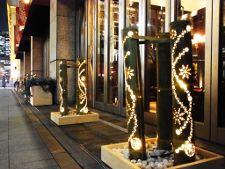 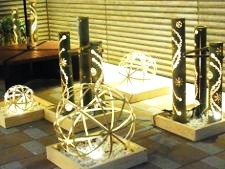
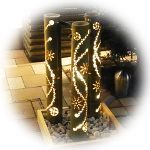 Currently, champagne gold is illuminated at Mitsui Main Building / Mitsui Tower in the Nihonbashi area, and illuminations (Modern EDO KIRIKO) with the motif of "Edo Kiriko" are being developed at Cored Muromachi Tower Dining Co., Ltd. (Producted for a limited time on December 19th. Currently, champagne gold is illuminated at Mitsui Main Building / Mitsui Tower in the Nihonbashi area, and illuminations (Modern EDO KIRIKO) with the motif of "Edo Kiriko" are being developed at Cored Muromachi Tower Dining Co., Ltd. (Producted for a limited time on December 19th.
Venue: Cored Muromachi 1-2 front (Edo Sakura-dori St., Ukiyokoji),
In front of Fukutoku Shrine (Ukiyo Path)
Period From December 19 to February 15, 2015
"Bamboo lights" are handmade one by one using green bamboo, with patterns of snow and cone, which are traditional Japanese beauty. I heard that the concept of circulating used bamboo (returning it into bamboo charcoal or compost to the earth) is suitable for an eco-friendly city Nihonbashi, so it was adopted for the first time.
Gentle and warm "light" and "shadow" create a fantastic atmosphere and add color to the roadside.
[Shitamachi Tom]
December 22, 2014 13:00
This year will be over soon. The flow of the year is fast. Chuo-ku is a commercial town, so this season is exactly the time of writing, such as shops and department stores. It's full of shoppers to prepare for New Year's Day.
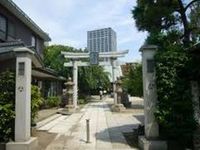 On the other hand, many shrines in the ward have a ritual called "great exorcism" on New Year's Eve. It has been practiced since ancient times as an important event to purify the filth of the year and pray for the well-being of the coming year. Even if it is not a religion, it will be a peace of mind for a moment in the sense that you reflect on your own failures and inadequate events of the year, forget what you do not like and think about the new year. Do you? On the other hand, many shrines in the ward have a ritual called "great exorcism" on New Year's Eve. It has been practiced since ancient times as an important event to purify the filth of the year and pray for the well-being of the coming year. Even if it is not a religion, it will be a peace of mind for a moment in the sense that you reflect on your own failures and inadequate events of the year, forget what you do not like and think about the new year. Do you?
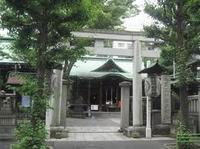 You can visit each local shrine, or visit a shrine that is concerned about going back and forth for shopping. You can visit each local shrine, or visit a shrine that is concerned about going back and forth for shopping.
There are also routes in Chuo-ku where you can enjoy cultural and history and walking at the same time, such as "Nihonbashi Seven Lucky Gods" and "Ginza Hachisha Tour", so it is recommended that you visit as a stroll on holidays during the year-end and New Year holidays.
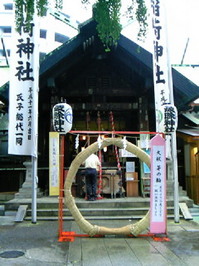 Then, if you come to Tsukiji Market to buy ingredients for New Year's cuisine, please drop in at [Namishi Inari Shrine]. From mid-month to January 10, "Chinowa" is installed in front of main hall. You can go through this ring to remove trouble. Why don't you make a New Year's pledge? Then, if you come to Tsukiji Market to buy ingredients for New Year's cuisine, please drop in at [Namishi Inari Shrine]. From mid-month to January 10, "Chinowa" is installed in front of main hall. You can go through this ring to remove trouble. Why don't you make a New Year's pledge?
Even if you don't usually go to shrines, many people go to "new year worshipping" on New Year's Day. I asked a certain person, but it seems that it is not good to ask God for various things realistically. Rather, it seems meaningful to look back on his vows, reflections, and gratitude in front of God. Depending on that attitude, there is also God's protection. So it would be quite nice to look back on the year quietly in the precincts that are not so crowded at the end of the year.
I hope that next year will be a better year for you.
Thank you very much for your continued support this year.
[Silver]
December 22, 2014 09:00
At the end of the year, you can hear Santa Clause is coming to town.
Tsukiji Foreign Settlement was established in the current Akashicho area in 1868 (1868).
Since then, the settlement has been built with Western architecture schools , hospitals , hospitals , churches, and residence , churches, and residence s, and this area has become a window for Western culture. s, and this area has become a window for Western culture.
With the amendment of the treaty in 1899 (1899), the settlement of Tsukiji was abolished as well as other settlements. There is an explanatory version describing the origin of the site. ・・ ・ I think this is an explanatory version in front of the St. Luke's Tower.
The above explanation was a part of the Chuo-ku Tourism Certification.
In Akashicho, there are many birthplaces of mission schools.
Today, I heard the Melo Day of Jingle Bell, so I visited the Catholic Tsukiji Church Cathedral. of Jingle Bell, so I visited the Catholic Tsukiji Church Cathedral.
The Catholic Tsukiji Church Cathedral was built in 1874 (1874) as the second Christian church following Nagasaki and Yokohama in the Tsukiji Foreign Settlement.
The cathedral was built in 1878, but it was burned down in the Great Kanto Earthquake, so this building was built in 1927 (1927) after the Taisho Earthquake.
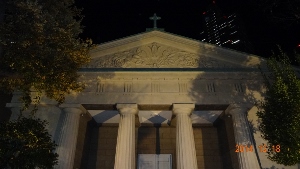
According to the introduction board of the Tokyo Metropolitan Cultural Properties, the Tokyo Metropolitan Government
This building was designed by Father Jirodias, Onjiro Ishikawa, a evangelist, and is a beautiful building in Yumi.
There are six Doria-style pillars, and the gable wall in front of the roof has sculptures  of roses and tulips. of roses and tulips.
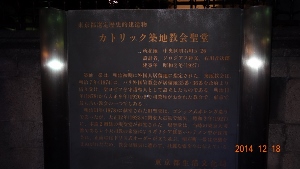
In addition, according to explanation version of Chuo-ku Board of Education, we understand the details again.
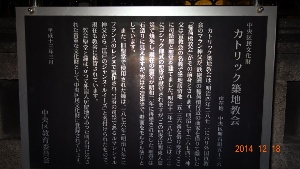
In the past, when I saw the interior of the church, there was a copper bell cast in France, which was designated as the central ward Tangible Cultural Property.
How about visiting a peaceful church during the busy hours of the end of the year?
Wishing you a Merry Christmas and a Happy New Year. 
Feliz Natal e prospero ano novo. Happy New Year.
[Mr.Chuo-ku]
December 19, 2014 15:00
Founded in 1899, Yoshinoya's founding store (the first store) is located in the central wholesale market food in Tsukiji, Chuo-ku, with approximately 1,800 stores in Japan and overseas as the largest beef bowl chain.
※↓Click to enlarge each photo and image.
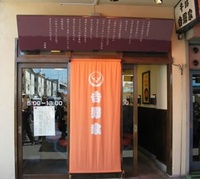
①Company name is Yoshinoya Co., Ltd. (English name: YOSHINOYA CO., LTD.)
※The character of Yoshi is correctly "soil" and "mouth".
②Founded in Nihonbashi Fish Bank, Chuo-ku

③The menu at the first store is only beef bowl, beef plate, and familiar side dishes such as miso soup and egg.

(1 company name, 2 photos, and 3 menu are excerpted from the official website.)
The following is a story I've heard.
The meat used at this first store is Japanese beef. Onion is also fresh and soft, and here Tsukiji is a place where "fresh ingredients" and "food professionals" gather, and you are also particular about beef bowls.
Also, at the time of ordering, options such as `` Negidaku '' and `` Tsuyudaku '' are all Yoshinoya, but at the first store, the degree varies depending on how many times you say `` dakudakudaku '' such as `` Negidakudaku '' and `` Tsuyudakudaku '' It seems to be. In addition, there are also "tsumeshiro (cold rice)" and "torodaku (a lot of meat fat)". The Tsukiji store, which was founded on the fish shore as Yoshinoya, seems to have special attention and has changed its stance from other stores.
Address: 5-2-1 Tsukiji, Chuo-ku, Tokyo Central Wholesale Market Food C
Business hours From 5:00 to 13:00
Regular holidays: In accordance with the Tsukiji Market
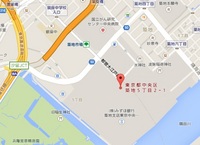
Official Homepage
Yoshinoya No. 1 store:
http://www.yoshinoya.com/shop/tsukiji/index.html
History of Yoshinoya:
http://www.yoshinoya.com/company/history.html
[Mapo ★]
December 19, 2014 09:00
This is also the shop that was listed on the lunch passport book.
The Miyake family is located on the second floor of the Ginza AZA Building on the back street of Ginza Matsuya.
I went to eat "Tama no Ontamameshi" here.
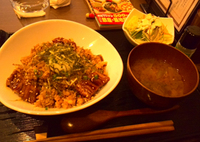 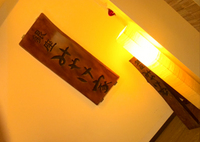
I didn't think about anything, but to the staff
"It's rare today! It's always sold out quickly."
Later, when I looked at the book, it was limited to 10 meals a day! ! Lucky (* ^^*)
It seems to be a shop produced by Tomoko Miyake, the original queen of eating.
The rice was a bit like a millet, and it was healthy♪
Anako is also savory and delicious★
It also comes with salad and miso soup.
By the way, the shop was smokeable and it was a bit disappointing.
The shop itself is a very homey space where you can relax!
The homepage of the Miyake family
[kimitaku]
December 17, 2014 16:00
Harumi-dori St.
From Reimei Bridge, look at Harumi Triton Square to the left and go straight ahead.
You can see Harumi Ohashi.
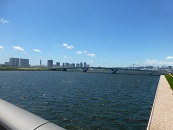
This bridge is quite steep.
Perfect for jogging and walking.
If you cross it as it is, you will head to the Toyosu district.
Yurikamome.
You can see the round Toden substation (here is a submarine cable and powered from Kisarazu) and the new market construction site (relocation of Tsukiji Market) far away.
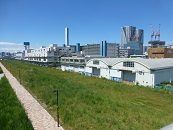
On the right hand, Harumi's warehouse group Rainbow Bridge Tokyo Bay
Takeshiba Wharf You can see Mount Fuji if it is sunny far away.
The left hand is LaLaport and Toyosu.
Once upon a time, there was a shipyard in Ishikawajima.
"Harumi Rinkai Park" has been created along the canal just before crossing Harumi Ohashi.
This park bicycle is prohibited.
Canals (sea?) even on holidays It's great for walking and jogging while watching.
Beyond that, there is also a sky tree.
 
|
Links
|
Currently, champagne gold is illuminated at Mitsui Main Building / Mitsui Tower in the Nihonbashi area, and illuminations (Modern EDO KIRIKO) with the motif of "Edo Kiriko" are being developed at Cored Muromachi Tower Dining Co., Ltd. (Producted for a limited time on December 19th.


















